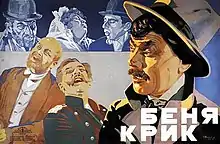Bennie the Howl
Bennie the Howl (Russian: Беня Крик, romanized: Benya Krik) is a 1926 Soviet silent film directed by Vladimir Vilner[1][2][3] and starring Yuri Shemskya as Benya Krik.
| Bennie the Howl | |
|---|---|
 | |
| Directed by | Vladimir Vilner[1] |
| Screenplay by | Isaak Babel |
| Based on | The Odessa Tales |
Release date |
|
Running time | 81 minutes |
| Country | Soviet Union |
| Language | Russian |
Krik is a fictional character in Isaak Babel's collection of short stories, The Odessa Tales. He also plays a prominent role in Babel's play Sunset. He is a Russian gangster of Jewish descent, and he and his gang of thugs are the main focus of the stories.
Cast
- Matvey Lyarov as Mendel Krik
- Yuri Shumsky as Benya Krik - Mendel's son
- Nikolai Nademsky as Kolka Pakovski
- Ivan Zamychkovsky as Gleczik - the policeman
- Sergei Minin as Sobkov - the comissar
- A. Goricheva
- A. Vabnik
- Teodor Brainin
- Georgi Astafyev
- A. Sashin as Savka
The Odessa Tales
Krik, who is also known as The King, is the leader of a group of thugs and smugglers, that operate in the Jewish ghetto Moldavanka in Odessa. He is married to Tsilya Eichbaum, whom he met when he was trying to shake down her father, as is detailed in the short story The King (Russian: Король). A couple of days after they met, he returned the protection money to Eichbaum, and asked for her hand later. The couple spent three months on honeymoon in Bessarabia, and returned for the wedding of Krik's sister Dvoira. Odessa's new police chief planned to use the wedding festivities to round up Krik's gang, but is thwarted by the arson of the police station.

See also
References
- Christie, Ian; Taylor, Professor Richard; Taylor, Richard (19 August 2005). Inside the Film Factory: New Approaches to Russian and Soviet Cinema. Routledge. pp. 145–. ISBN 9781134944330. Retrieved 13 March 2014.
- Jay Leyda (1960). Kino: A History of the Russian and Soviet Film. George Allen & Unwin. p. 230.
- "Беня Крик. Х/ф". Russia-K.